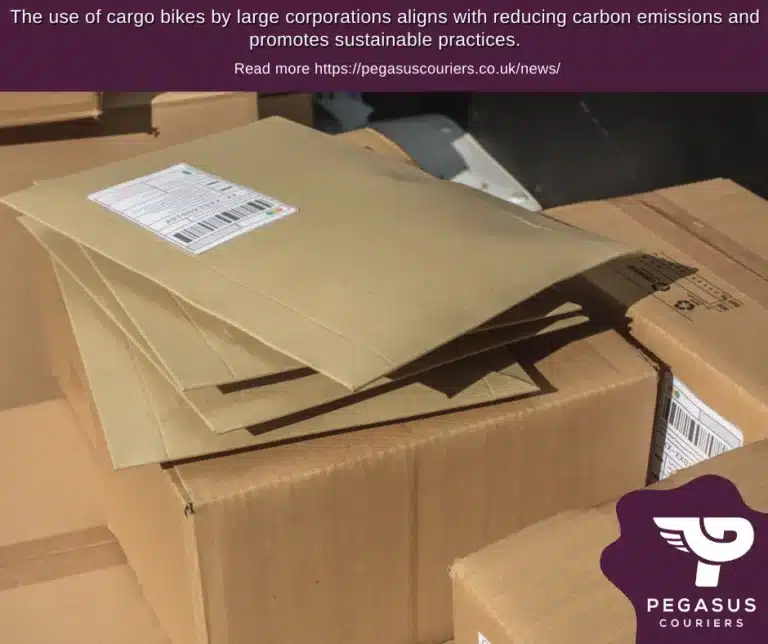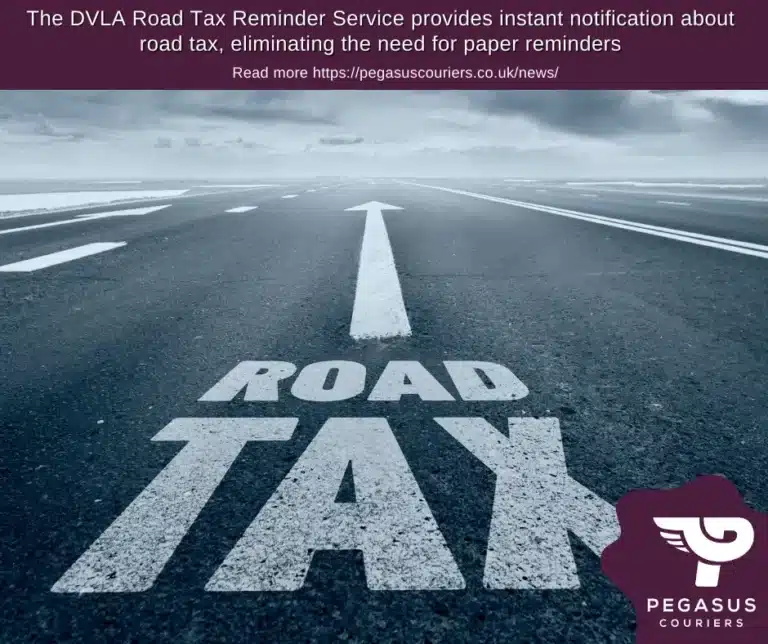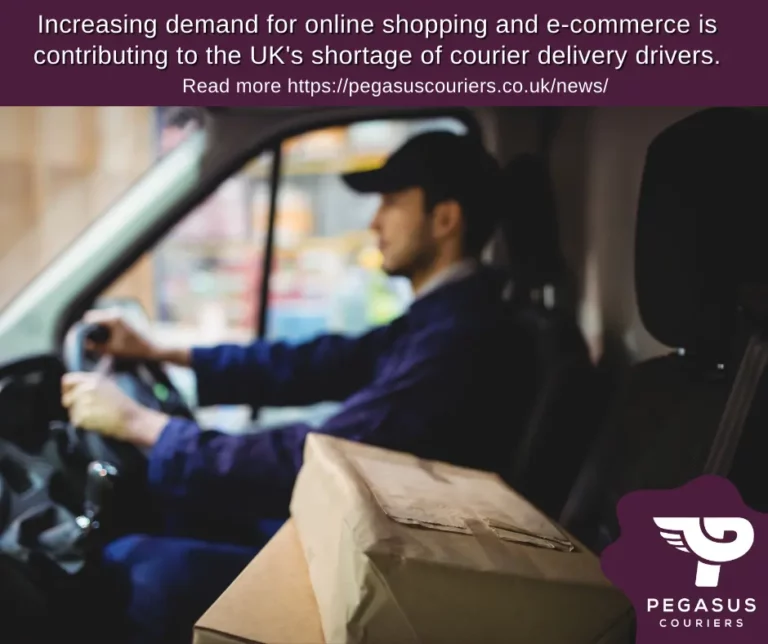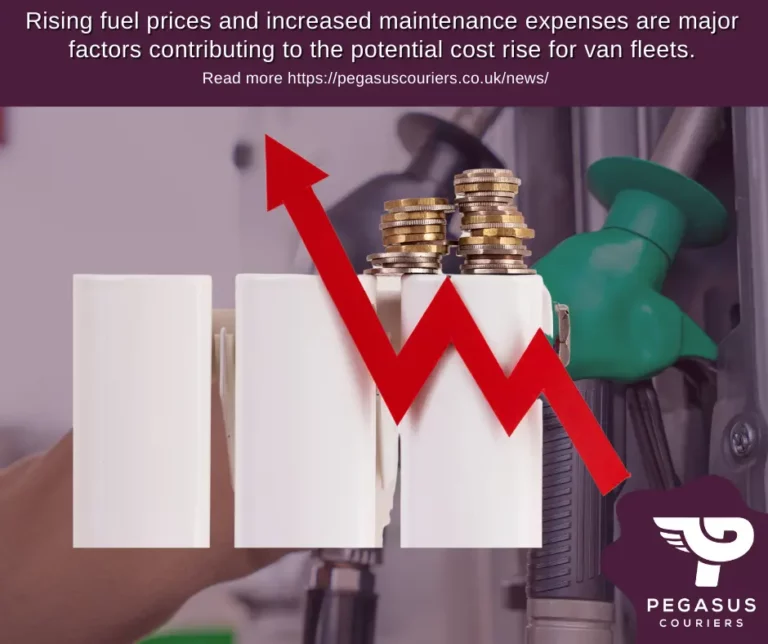Courier Bikes The Future of Parcel Delivery?

Martin Smith
Pegasus Couriers MD

Learn how they reduce congestion, pollution, and costs, and why they’re quickly becoming the preferred choice for enterprises and cities alike.
Here we discuss teething problems and how electric cargo bikes can transform urban transportation.
The Rise of Cargo Bikes in Urban Delivery
Cargo bikes, especially those with electric-assist capabilities, have gained popularity in urban delivery due to their ability to navigate through congested areas and reduce carbon emissions. These bikes offer a sustainable and efficient solution for transporting goods in busy cities. However, like anything else, there are pros and cons to consider.
The compact size and manoeuvrability of cargo bikes allow them to easily weave through traffic and reach destinations faster than traditional delivery vans. However, factors such as parcel size, volume, distance from the depot, and more can impact bike delivery efficiency. Despite these challenges, the shift towards cargo bikes signifies a greener future in urban delivery. We have known from other discussions about electric vans that teething problems first need to be addressed before the concept is embraced industry wide.
Last Mile Deliveries Ideal for Bikes
The industry is revolutionising how goods are delivered by harnessing the power of electric-assisted bikes.
Cargo bikes can potentially transform the entire logistics landscape – particularly for last-mile deliveries. With their nimble manoeuvrability, they can effortlessly navigate through traffic, bypassing congestion and delivering packages with unparalleled speed.
They are catalysts for change, representing a shift towards a more economically sustainable future, especially for last-minute couriers. However, some scepticism remains, likely similar to what we see with the lack of charging stations for electric vans in remote locations.
Speed: Cargo Bikes Vs Delivery Vans
When it comes to speed, you’ll be surprised to learn how cargo bikes compare to traditional delivery vans.
In a study by the University of Westminster, cargo bikes were found to be 1.6 times faster than vans in London.
With their ability to navigate congested urban environments and lack of parking space requirements, cargo bikes offer a faster and more efficient last-mile delivery alternative. Bikes are cheaper to run operationally, with lower costs for mechanical servicing, road taxes, breakdowns, and repairs.
A Network of Urban Hubs for Bike Operations
Creating a network of urban logistics hubs is essential for efficiently operating cargo bike deliveries in busy urban areas. These hubs are centralised locations where cargo bikes can pick up and drop off packages, allowing for streamlined and organised delivery routes.
Currently, the government is looking at where to strategically place hubs throughout cities so businesses can optimise their delivery operations, reduce congestion, and minimise carbon emissions.
Frequently Asked Questions
Are There Any Limitations to the Carrying Capacity of Cargo Bikes Compared to Delivery Vans?
Yes, there are limitations to the carrying capacity of cargo bikes compared to traditional delivery vans. Cargo bikes can carry fewer parcels at a time, but they make up for it with their agility, speed, and ability to navigate congested urban environments.
What Are Some Sustainable Initiatives and Partnerships in the Cargo Bike Delivery Industry?
Some sustainable initiatives and partnerships in the cargo bike delivery industry include companies piloting solar-powered cargo bikes. These initiatives align with the goal of reducing carbon emissions and promoting sustainability.
Is There a Need for Financing and Rental Schemes for Cargo Bikes?
Yes, there is a need for financing and rental schemes for cargo bikes. These schemes can help businesses realise social, environmental, and commercial benefits, while also promoting a cleaner and more sustainable way of delivering goods.
How Are Cargo Bikes Transforming Fulfillment Operations for Businesses?
Cargo bikes are transforming fulfillment operations for businesses by providing a sustainable and efficient alternative to traditional delivery vans. They reduce congestion, deliver faster, and don't require parking space. Several companies are adopting this eco-friendly solution.
Sustainable Initiatives in Cargo Bike Delivery
Currently, solar-powered cargo bikes are being tested in the UK. By using solar power, these cargo bikes provide renewable energy for their deliveries, further minimising their environmental impact.
Interestingly, the Trades Union Congress (TUC) estimates that about 4.4 million people in the UK are platform gig economy workers – mainly using bikes to deliver.
There is, however, no denying that cargo bikes cannot be ignored. For example, a government report released earlier this year states that a sixth of van deliveries in London could be replaced by bikes in less than seven years.
Limitations, Worker Issues and Policing
At face value, cargo bikes seem like a no-brainer with no fuel costs, minimal outlay, and faster delivery time in congested areas such as city centres.
However, there are several other logistical aspects to consider, such as the load a cargo bike can carry, environmental factors, the size of parcels, the distance one needs to travel, and the legalities such as speed, worker rights, etc. Remember, these are bikes – not cars.
Cyclists do not need a licence, nor must their bike be registered or taxed – like a vehicle.
But using motors to hit speeds of more than 15.5mph is illegal.
More powerful e-bikes can reach speeds of 28mph, but these are illegal under UK law and are classed as a motorcycle or moped.
We already see organisations such as Electric Safety First lashing out at the gig economy and fast food delivery brands wanting them to take responsibility for their bike drivers.
Earlier this year, there was an article about riders on e-bikes in the Glasgow City Centre flouting rules and being a danger to pedestrians.
Teething problems will better the industry.
Despite challenges, the rise of cargo bikes in urban delivery holds great promise for sustainable transportation. These bikes offer numerous environmental benefits and have been proven to be faster and more efficient than delivery vans in major city centres. While there are still teething problems to address, much like the concept of electric van delivery, it is clear that cargo bikes have the potential to revolutionise the way last-mile goods are delivered.
Become a Delivery Driver? Contact Us Today
We are always looking for new drivers to join our team. At Pegasus Couriers, we provide training, support, and opportunities for growth. We are a family-owned business with a long history of success. Contact us today to learn more about our driver opportunities.

Digital DVLA Account - good?
The Driver and Vehicle Licensing Agency (DVLA) has launched a new and improved digital account service to make our lives on the road much easier.

Shortage of Skilled Courier Drivers
The delivery industry faces a crisis: a shortage of skilled courier drivers. We talk about the challenges facing delivery driver recruitment.

Van Costs Set To Rise
Businesses continue to rely heavily on van fleets for various operations. Here Pegasus Couriers discuss rising fleet and recruitment cost